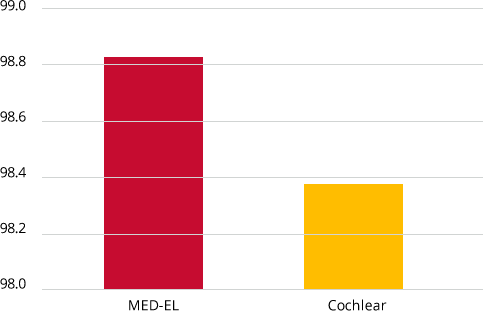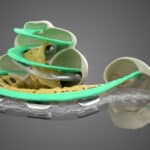Why Cochlear Implant Reliability Matters

Why is cochlear implant reliability such an important topic? When a candidate chooses a cochlear implant, they want to know that it is the right decision. They want the peace of mind knowing that their implant will last for many years.
As a clinician, you know how important it is to make informed decisions. Cochlear implant candidates are making a life-changing decision, so they deserve honest and transparent information. They need to be able to set realistic expectations and make well-informed decisions.
Today, we’re going to look at what cochlear implant reliability really means, and why it’s so important to look at the whole picture.
Long-Term Reliability
You might have seen graphs comparing reliability statistics between different cochlear implant brands. However, many of these reliability claims only cover a self-defined subset of implant failures. They may even disguise the replacement of a partial implant failure as an “upgrade”.
Are these cherry-picked claims really an honest way to communicate to candidates making a life-changing decision? What happens when you do a fair and unbiased comparison of reliability data between all implants over time?
If you look at reliability data of all cochlear implants from each company over more than 10 years, the difference is clear. By calculating relative risk of implant failure, it’s clear that MED-EL’s titanium implants offer exceptional long-term reliability. For more than 10 years, MED-EL titanium cochlear implants have offered outstanding reliability and performance for our recipients.
 When you examine reliability of all implants over 10+ years, it’s clear that MED-EL offers the reliability your patients deserve.1
When you examine reliability of all implants over 10+ years, it’s clear that MED-EL offers the reliability your patients deserve.1
Comprehensive Reliability Reporting
With cochlear implant reliability, it’s important to look at the whole picture. Successful outcomes with an implant relies on many factors. Candidates deserve clear information so they can form realistic expectations and make well-informed decisions.
That’s why MED-EL openly reports our extended cumulative survival percentage for more than 10 years. This is a comprehensive reporting that includes every issue, including medical related failures. If an implant has to be removed for any reason, we count it against our reliability in our openly published extended CSR data.
Why do we choose to share such transparent and detailed reliability information? MED-EL has always been privately owned. From the very beginning through today, MED-EL has been guided by our founders, the inventors of the modern micro-electronic multichannel cochlear implant.
We’re focused on our recipients. To us, reliability isn’t just a number—it’s a commitment to providing our recipients with the best possible benefit from their implant.
Limited Transparency
Clearly, this extended CSR reliability data is essential information for both clinicians and candidates. Yet no other cochlear implant company reports this data. Instead, both Cochlear and Advanced Bionics choose to only report a limited subset of self-selected reliability issues.
Wang et al. (2014) states that “[failure to include extended CSR] should be recognized by the clinicians as an incomplete view which is limited to device survival or failure.” Roby et al. (2012) states “These rates can often be misleading to patients, as it is not always explicit what is considered a failure by the company.”3,4
So, if such limited reporting can be considered misleading to candidates, why do other manufacturers choose to use this incomplete method?
When analysis was extended to include medical-related failures, some manufacturers had failure rates up to 5x higher than officially reported by the company. Perhaps these peer-reviewed studies shed light on why other companies choose to cherry-pick favorable numbers instead of reporting honest, realistic reliability figures.2,3,4
Complete System Reliability
So, that you know what to look for in implant reliability data—what’s the next step? In part two of this series on cochlear implant reliability, we’ll go over more key factors that make MED-EL cochlear implant systems such an excellent choice for long-term safety and reliability.
And of course, you can always find our comprehensive reliability reports over at medel.com.
Subscribe & Share
Have a question about reliability and cochlear implants? Leave a comment below or let us know with our simple contact form.
Don’t forget to subscribe to get the latest articles sent right to your inbox!
References:
1. The combined failure rate was calculated for Advanced Bionics and Cochlear by estimating the number of failed devices from their publicly accessible reliability reports (Advanced Bionics 2017 Global Implant Reliability Report; Cochlear Nucleus Implant Reliability Report, Volume 15 / January 2017) and comparing those to the total number of registered implants; in the case of Cochlear, the Nucleus CI24RE, Nucleus CI500 series and the Nucleus Profile series implants were included in the calculations, covering the time period of 2005 to 2017; for Advanced Bionics, the calculations are based on the HiRes 90K, HiRes 90K Advantage and HiRes Ultra cochlear implants, covering the time period of 2004 to 2017. Please note, that Advanced Bionics and Cochlear only report a self-selected sub-category of failures, so the numbers presented may underestimate the total failure rates for Advanced Bionics HiRes implants and Cochlear Nucleus implants.
The combined rate for MED-EL implants was calculated using the information on device-related failures from the MED-EL complaint database for the SONATA, CONCERTO and SYNCHRONY implants, covering a time-frame of 11 years (2006 to latest data of July 2017); this database is used as a tool for monitoring of all products that are put on the market, and its validity is regularly inspected by authorities, such as the FDA.
2. FDA Medical Device Recall Database
3. Wang, J.T., Wang, A.Y., Psarros, C., & Da Cruz, M. (2014). Rates of revision and device failure in cochlear implant surgery: a 30-year experience. Laryngoscope. 124(10):2393–2399.
4. Roby, B.B., Ferrello, M., Huang, T.C., Rimell, F.L., & Levine, S.C. (2012). Symptom timeline preceding cochlear implant failure: an institutional experience. Otolaryngol Head Neck Surg.146(5):782–787.
CTA Form Success Message
Send us a message
Field is required
John Doe
Field is required
name@mail.com
Field is required
What do you think?
The content on this website is for general informational purposes only and should not be taken as medical advice. Please contact your doctor or hearing specialist to learn what type of hearing solution is suitable for your specific needs. Not all products, features, or indications shown are approved in all countries.



